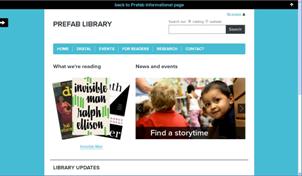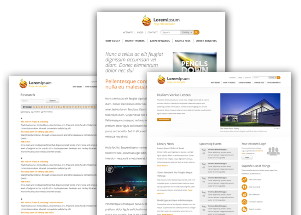
The Prefab template allows users to choose from a selection of six color schemes
Library web hosting provider LISHost this month launched Library CMS, a modular, Drupal-based content management system template tailored to the needs of library websites. The move follows the March debut of Prefab, a WordPress-based CMS template designed for libraries by user experience (UX) consultancy Influx. Both are offered in conjunction with web hosting and are positioned as affordable, comprehensive website redesign services for individual libraries and small systems.
With Prefab, “the goal was to make a design that is as universal as possible for libraries, because so many small- and medium-sized libraries are out there trying to solve the same design problems,” said Aaron Schmidt, a principal of Influx and LJ The User Experience columnist.
Sean Fitzpatrick, developer for LISHost, also saw an opportunity in the market. “In our custom end-to-end jobs [producing websites for libraries], we were hearing a lot of the same requests and tackling the same issues, so we thought, why don’t we offer this as a package?” he explained. “Features like the online resource directory and the events calendar were common features that we were developing over and over again. We just thought we could roll them into one CMS package.”
Both templates use responsive web design (RWD) techniques to optimize a site’s content for tablet or mobile access. Both also include common features popular with library websites, such as events listings, news feeds, and resource directories. And with WordPress and Drupal functioning as the back-end content management systems of Prefab and Library CMS, respectively, librarians won’t need to know HTML to add or remove content, link the sites to their ILS, or make minor modifications, such as swapping out images or logos.

Library CMS opts for a clean, minimalist look
Both templates were also designed by librarians. Led by Fitzpatrick and LISNews.org founder Blake Carver, LISHost has offered hosting services to libraries and library-focused publications since 2002. And Influx is led by Schmidt, a former library director, along with Amanda Etches, head of discovery and access for the University of Guelph, Ontario, Canada.
Having a library background inform their design choices helps ensure the template’s functionality, Schmidt says. “Libraries, if they don’t have the technical skill but they have money, they sometimes hire out the web design process, and often design firms aren’t as focused on user experience. They’re focused on visual design,” he said. “If a library hires out, they might get a site that doesn’t meet their users’ needs.”
Pricing is similar for both services. For Prefab, a $1500 setup fee and a $500 per year hosting fee includes initial setup, information architecture (IA) and navigation suggestions, domain setup help, back end training, and email and phone support. Library CMS currently offers a similar package for a $1495 setup fee and $450 per year hosting fee, and says that they will negotiate lower prices for very small libraries. Additional customization and development is available from both providers on an a la carte basis.
Seeking simplicity
One common problem is that many library sites try to do too much at once. Libraries offer a wide range of services and programs, as well as links to external resources, so sites developed by people who don’t have a background in UX or design often tend to get cluttered. Inconsistent typography and clashing color schemes can also be off-putting to users.
Fitzpatrick aimed to solve these problems when designing Library CMS. “We’re trying to address some of those issues by offering a really simplified design that’s open, elegant, and minimal,” he said.
The goals of simplicity and functionality underpin both templates, resulting in two modern designs with different aesthetics—Prefab is more colorful, where Library CMS opts for a more minimalist look. The templates are both modular to some extent, but both Schmidt and Fitzpatrick suggested that, when possible, libraries should avoid cluttering their websites.
“The desire to have everything out front and ‘above the fold’ is really counterproductive, because the end users are just overloaded with information,” Fitzpatrick explained. “Usability studies tend to show that users don’t mind clicking once or twice to get to relevant information.”
Schmidt noted that simple, clean website designs also force libraries to really think about what they want users to see when they visit a site.
“Our site is designed to be as simple and small as possible on purpose,” he said. He even tends to discourage the use of dropdown menus, “because we want [libraries] to make tough choices about what they want to promote, and we want people to avoid having the ‘kitchen sink syndrome’… where they put every link under the sun [beneath] their main navigation menu. That reduces usability.”



What a great resource for smaller libraries! As a Web Librarian working with Drupal, it can be a simple or as customized as you want. Taking advantage and running with simple design is cheap and easy for libraries to maintain.
It would be great to see this take off as a trend, and libraries could develop their websites around similar principles. I think it is one of the draw cards of social media, ie, participants use the same playing field so questions about how to navigate and read the information are consistent for the user.
It would be good to see an ‘open-source’ version of this for web developers confident with Drupal to play around with on their own servers, but then again $1500 is very affordable.
This combines the main advantages of a dedicated service plus a shared one.
There is surely an option to put two different websites under different heads with the aid of a separator.
It is obviously advisable that while choosing internet hosting solution on your web portal,
you must never compromise while using services, in case you have to compromise a bit about the price.
This stuff will really give libraries a head start. I worked around website purists that thought that everything should be done from scratch…who has time for that. Aren’t there better things to do than ride the pony express to deliver the mail? I think thats why the postal service was formed eh?
Great add on, nice write up!
Pat
Hey Matt, I think keeping the CMS lean and mean is the way to go (in the best sense of course – the ‘mean’ part). Too much clutter in any platform design can cause language upgrade bugs and all kinds of fun stuff. Great write up. Thanks for the info.